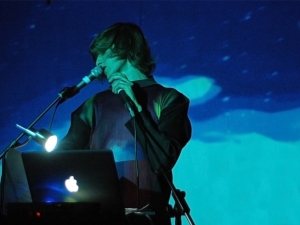Third of my conversations in the run up to EVP (info and tickets here), with Anat Ben David. This conversation references previous interviews, looking at the vastly contrasting attitudes towards performance and audience between Steven Fowler ("Fundamentally I do indeed not consider the audience at all"), and Ross Sutherland ("for me, the audience is part of the work"). Here Anat brings her considered impression to the table, discusses her creative practice from composition to performance, and gives us a sneak peak what you can expect on Thursday.
[TICKETS are still available from our shop for £5. They will be £6/7 on the door.]
[Running order here]
NATHAN How do you relate to the audience for your work? You reference pop music, videos and lyrics as an inspiration, and it's pretty clear that they're there, but I'd say that your work is certainly more confrontational than really a gig-going experience would be, and perhaps more opaque at points too, like there's some kind of meaning to divine in there, but it's complex and you have to work through it for those moments. The problem which opacity in performance though, especially when it's matched with a sense of confrontation, is that it can push people away can't it? How do you deal with that?
ANAT
Although made out of individuals, the ‘Audience', is perceived as a unity that reacts and fluctuates as one, it's Audible- it has one sound. The performer engages with that phenomenon, in the same way of addressing the audience as if it was a unity.
As a performer, its hard to tell what the audience is, until one confronts it, at that point, a relationship is formed, that relationship oscillates between the performer's intentions and the audience's mood, this relationship creates an opportunity for a political moment diverted by the performer, in that sense this idea could relate to Brecht's alienation effect. You talk about opacity- a confrontational situation could be a kind of filter- when the situation demands a confrontational edge, this is not always the case though, sometimes a situation needs different filters. It is truly in the moment, a live moment that creates meaning. Personally, I never wish to push people out, only create a meaningful interaction, sometimes confrontational is just what you need to melt that freezing edge.
NATHAN
In his interview, Ross talks about conceptual writing and suchlike, where 'creation' is abandoned for 'presentation'. In your work cut-up and montage of text clearly play a part, and we spoke about the way that the meaning for you will often form in the process of learning and developing a vocal performance from a montage text. Can you talk a little about the kind of decisions you're making when you're in that 'writing', montage or composition mode, before you turn towards performance?
ANAT
For me, the creative process is always in flux, its essence lays in the intermedium, in a way that meaning is formed between mediums -always re-invented, therefore, in order to understand what ‘I mean' or what I want to mean for others; I will exercise the word, transform a word through sound and then, listen to the meaning that comes out of this event, its a learned experience. In the first stage I do it internally, in my head, then exercised as sound, it really is magic- to hear some words together and realize how much they can change meaning.
Decision-making comes into place when something makes sense to me, by sense I mean, something that rings fresh and suggests new meaning, then I try to fix it. Improvisation can be a powerful tool, to release forwards new meanings.
NATHAN
What do you have planned for Oto?
ANAT
I'm going to work with John Wollaston a sound artist, its been a really fascinating to work with John, his sound machines operate in an unpredictable manner to an extent, so we try to create a method, whereby, some general overall structure compiles margins that we operate within, we are free to improvise, but this improvisation is a tense one as its always held within a structure. A song could never really be the same, there isn't a wrong way of doing a song; there is only difference and repetitions. The sound is complex, although we try simplifying and minimizing the layers, this is a result of fluctuation.

